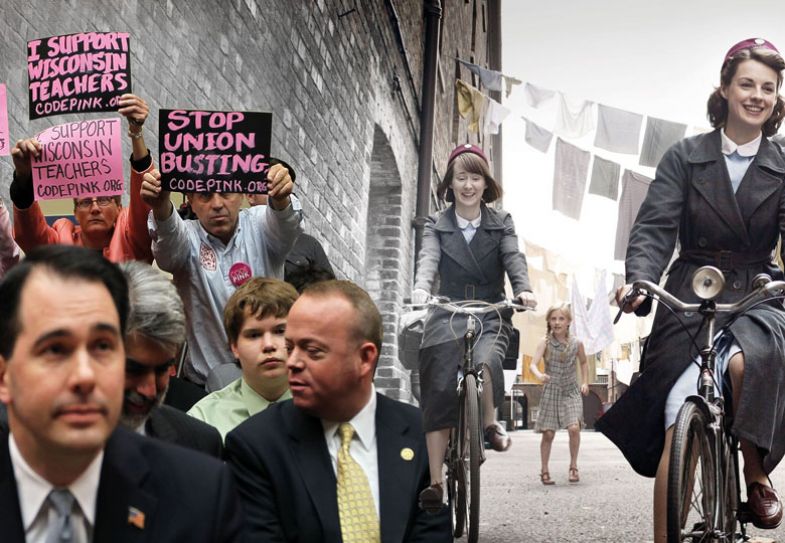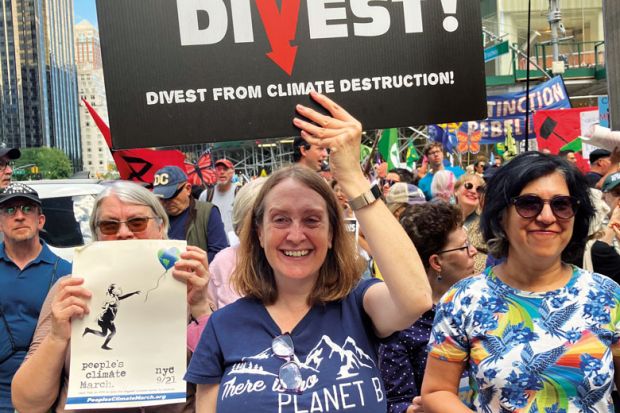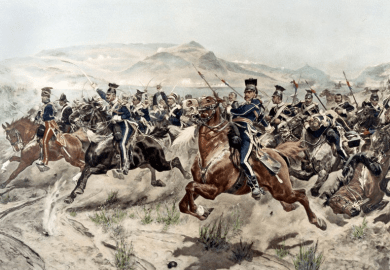If scholars are keen to stir students into action on climate catastrophe, adding a hard-hitting popular science book on global warming to the reading list might seem a logical move. Others might recommend ecologically relevant writings from the likes of philosophers, anthropologists or political or post-colonial theorists. Unfortunately, many of these well-meaning but gloomy works only breed a sense of “hopelessness and powerlessness”, believes Caroline Levine, one of the US’ foremost literary studies scholars.
In her new book, The Activist Humanist: Form and Method in the Climate Crisis (Princeton University Press), the Cornell University humanities professor explains that it does not need to be this way, setting out how academics can use art, literature, film and cultural writings to encourage more effective political engagement among their students. Levine does so partly by exploring a highly “unfamiliar canon” of popular works often dismissed as sentimental pap by high-minded academic critics.
Take the BBC’s long-running drama Call the Midwife, set in London’s East End during the early days of the UK’s National Health Service. The series, argues Levine, gives concrete form to radical ideals because it “teaches audiences to feel desire for the ordinary workings of a smoothly functioning public infrastructure”.
She would also like us to look again at the 1980 movie Fame, a drama focused on ambitious New York performing arts students confronting the harsh world of show business. That drama and its spin-off TV series highlight “the narrative of the struggling team”, says Levine, and they vividly reveal the inevitable tensions and compromises that underlie a successful political campaign.
These touchstones for political activism are unusual but are consistent with a career in which Levine has championed all sorts of arts and literature, insisting on their value to humanities scholarship. Her eclectic tastes stem, in part, from an early rebellion against her parents’ highbrow tastes. Although they had grown up in poverty during Great Depression of the 1930s, they shared a passion for European high culture dating from between 1300 and 1750 and a disdain for anything outside this period. They even owned a harpsichord rather than a much-too-modern piano, Levine recalls. Her reaction was to immerse herself in Victorian novels – a page-turning genre bizarrely considered lowbrow by her mother and father.
When she went on to study comparative literature at Princeton University, Levine’s teachers also looked down on popular culture, preferring the “high modernism” of T. S. Eliot, James Joyce and Virginia Woolf, which examined states of consciousness and challenged conventional beliefs. In contrast, her teachers gave little credit to the dramatic twists and turns in a plot because sophisticated readers were not supposed to be interested in storylines and suspense, she recalls. Her second book, Provoking Democracy: Why We Need the Arts, embraced this tradition of scholarship, arguing that challenging, often unpopular art “is actually good for democracies” because it puts “a kind of pressure on mainstream or majority views that helps expand us beyond what we already think”.

Yet Levine also had significant reservations about certain aspects of her academic training and, indeed, parental values. Some forms of popular culture, she tells Times Higher Education, can be “complicated, interesting, smart, transgressive and inventive”. She rejects the notion, common among many scholars in the humanities, that “popular culture is just one big corporate conspiracy to turn us into passive dupes”.
She decided to specialise in the literature of the Victorian era, she claims, partly because it was a time when “the canonical works [by writers such as Charles Dickens, George Eliot and the Brontës] are also popular works”, keen to engage every kind of reader. This was the theme developed in her book The Serious Pleasures of Suspense: Victorian Realism and Narrative Doubt, which argued that suspenseful plots are as essential to highbrow realist novels as they are to sensational mysteries and gothic horrors.
So Levine has always been engaged in the fierce debates about what kinds of works it is most worth studying in what she calls “the aesthetic humanities”, a field covering art history, musicology, media and cultural as well as literary studies. The Activist Humanist raises the stakes by relating such arguments to crucial political questions. Do the humanities, it asks, help or hinder us in addressing the vast challenges we face today?
The book opens by considering Levine’s students, many of whom are deeply distressed by the climate crisis and are often majoring in subjects such as business, engineering and agriculture because they hope to make a difference. But while they generally do their bit for the planet by recycling their waste, cycling instead of driving, and cutting back on meat, they also feel impotent, unable to see how they can make an impact on a larger scale.
The Activist Humanist urges students to go further. It includes a useful workbook that Levine has used with her engineering students to shake them out of passivity and pessimism. In it, she advises university teachers to ask their students how many hours a month can be spared for activism and then ask them to commit to that target. Undergraduates might also be asked to research a range of campaigning groups to join, she says, or at least identify a group whose values match their own. Levine sees them as a useful way to “get the wheels turning”.
She herself has long been involved in political activism. At the University of Wisconsin-Madison, where she was based for almost 15 years before moving to Cornell, she helped to mobilise action against state-led union-busting.
“One of the main shaping events of my life happened in 2011,” she recalls. “Scott Walker was elected as the Republican governor of Wisconsin, and his first action was to try to prohibit public employee unions. The faculty were not unionised at the University of Wisconsin, but our graduate students were unionised. They were the first graduate student union in the United States, and they had just been dissolved by the governor.” Faculty support for their students on this particular issue soon swelled into a much wider protest.
For many years, Levine reflects, “it felt like I had to do the activism in my private capacity and the scholarship was my professional work, and they shouldn’t actually speak to one another. But that got less and less persuasive as time went on, mostly because the climate crisis is such an existential emergency.”
In 2020, Levine was part of the team that convinced Cornell to divest from all its investments in fossil fuels. (Her book describes tactics such as students staging “a mock wedding between the university and the fossil fuel industry at a busy network hub on campus”.) Although she admits that this will not have a “massive global effect” in itself, “divesting a $8 billion [£6.6 billion] endowment” still felt a lot more significant than a purely personal action such as divesting her own bank account. What was striking was how many well-meaning colleagues who shared her basic values tried to discourage her, on the grounds that the university either had so much invested in fossil fuels that it would never agree to divest or had so little invested that the action would only count as a meaningless symbolic gesture.
These completely contradictory arguments suggested to Levine that people were desperately seeking rationalisations for inaction: “What suddenly clicked into place for me is that naysaying feels to people like a sophisticated argument, and it actually isn’t: it’s a kind of knee-jerk response to decide beforehand that things won’t work…It feels very important that we rethink that knee-jerk naysaying.”
Her book, therefore, sets out to examine whether there is something about the assumptions in much of the humanities that make people far better at critiquing existing institutions than at following through with effective action to change them. It describes, for example, a tendency to “valorize the works of art that revolutionize consciousness – that wake us up to injustice and oppression – without advocating for any specific course of action to redress those wrongs”.
Here we return to the themes of Levine’s first two books. A commitment to studying very difficult, challenging texts and a hostility towards popular culture often lead to a contempt for many prominent features of the broader cultural landscape: catchy tunes; realistic fiction; novels that celebrate home and family or end happily; indeed, “hopeful stories” in general. Yet all of these, in Levine’s view, can play a role in helping people take effective political action.
TV dramas such as Call the Midwife and Fame should not be dismissed as lightweight exercises in sentiment given the positive narratives of change they contain, she says. Likewise, ethnographer Matthew Desmond’s celebrated study Evicted: Poverty and Profit in the American City, which uses “novelistic” techniques to illuminate the hopes and dreams of its protagonists but concludes with some sharp policy suggestions. All can help us understand, according to The Activist Humanist, the nature of effective collective action.
There is another tendency in the humanities that Levine is keen to call out, namely a habit of dismissing institutions because of their tainted origins. Universities themselves, of course, are one such institution. Several Ivy League institutions – including Harvard and Brown universities – have been forced to confront dark parts of their past, such as their inheritance from slavery, while flagship state universities awarded vast amounts of land by the 1862 Morrill Land-Grant Act have also faced questions about the dispossession of indigenous American tribes. Levine’s book does not shirk these difficult questions but points out that “universities sustain a range of forms that do not exclusively serve genocidal or neoliberal agendas”.
Asked about this, she notes that some of the most powerful critiques of the university have been made by “humanist scholars who come from and study the very groups that have most suffered from modern power structures. The university has been complicit in colonialism, capitalism and indigenous dispossession. Cornell is built on land that was just taken from the Cayuga Nation. So the university isn’t innocent.”
Nonetheless, Levine also believes that universities (and other institutions) with tainted origins can still be repurposed for positive ends.
“I sometimes think that my whole project”, she reflects, “is an answer to [black philosopher and activist] Audre Lorde’s famous claim that ‘The master’s tools will never dismantle the master’s house’. And I think, actually, maybe they can. Can you use the university for good? What are its different pieces? How can we work with them? That to me is more hopeful and more engaged but also sees even some of the things that come from a tainted past as reusable, capable of being turned to new ends.”
For example, the medical humanities is often used to help trainee physicians to think about death and dying, says Levine, but it can also help them to “think about the racial disparities in medicine through the humanities”.
Without the broader perspective of humanists, continues Levine, the ideal of “climate justice” would not exist given their role in considering “how some technocratic solutions have been really terrible for people of colour around the world”.
Humanists can also help students such as the aspiring engineers in her classroom, Levine goes on, to consider “their responsibilities beyond the specific expertise that they have” and “the limits of what engineering can do”.
More generally, she would like us to “rethink university structures so that there are more conversations between people in different fields”. Some economists, she says, have adopted models that “have led them to the conclusion that, for example, a four-degree rise in temperatures over pre-industrial levels is going to have a negligible impact on the global economy. Any climate scientists will tell you that’s got to be wrong.” Yet because the economists don’t talk to the climate scientists, “there is peer-reviewed economic research which is circulating and it’s that research your pension fund is consulting when it thinks about whether it should invest in fossil fuels.”
So where does this leave debates about what the humanities should focus on?
The Activist Humanist is very clear that it should be seen as “not a break” with the kind of academic training Levine grew up with, but rather as “a refocusing and a revaluing” of it.
She still thinks it is valuable, she explains, to study the kind of “really tough, challenging work of art that asks you to think about how fragmented you are and how your consciousness is not made up of some kind of coherent and logical set of connections”. On the other hand, such works “don’t give you steps for figuring out how you’re going to change the world. Fame has a model for how you come together as a group of people to make something beautiful. And that’s a totally different kind of usefulness.”
So, as in her first two books, Levine still remains committed to established scholarly practice while also wanting to do something different. For many readers, however, her new book will feel like a sharp challenge to humanists to rethink many of their cherished assumptions.
Register to continue
Why register?
- Registration is free and only takes a moment
- Once registered, you can read 3 articles a month
- Sign up for our newsletter
Subscribe
Or subscribe for unlimited access to:
- Unlimited access to news, views, insights & reviews
- Digital editions
- Digital access to THE’s university and college rankings analysis
Already registered or a current subscriber? Login








